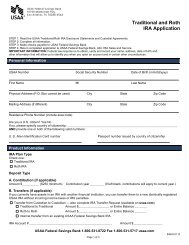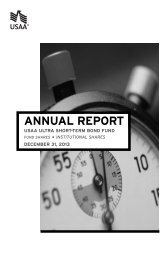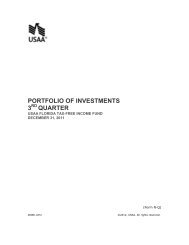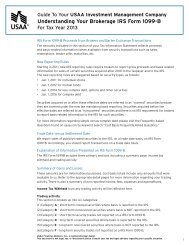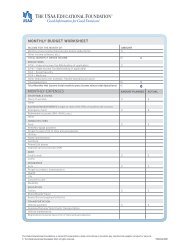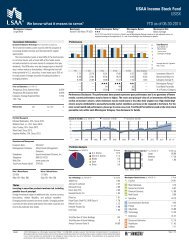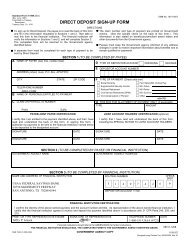Prospectus - USAA
Prospectus - USAA
Prospectus - USAA
Create successful ePaper yourself
Turn your PDF publications into a flip-book with our unique Google optimized e-Paper software.
of that security to decline. The Fund accepts some credit risk as a recognized<br />
means to enhance an investor’s return. All securities varying from the highest<br />
quality to very speculative have some degree of credit risk.<br />
As a mutual fund that has the ability to invest in bonds, there is a risk that the<br />
market value of the bonds in the Fund’s portfolio will fluctuate because of<br />
changes in interest rates, changes in supply and demand for tax-exempt<br />
securities, or other market factors. Bond prices are linked to the prevailing<br />
market interest rates. In general, when interest rates rise, bond prices fall and<br />
when interest rates fall, bond prices rise. The price volatility of a bond also<br />
depends on its maturity. Generally, the longer the maturity of a bond, the greater<br />
is its sensitivity to interest rates. To compensate investors for this higher interest<br />
rate risk, bonds with longer maturities generally offer higher yields than bonds<br />
with shorter maturities. The Fund may be subject to a greater risk of rising<br />
interest rates due to the current period of historically low rates.<br />
During a period of declining interest rates, many municipal bonds may be<br />
"called," or redeemed, by the issuer before the stated maturity. An issuer might<br />
call, or refinance, a higher-yielding bond for the same reason that a homeowner<br />
would refinance a home mortgage. When bonds are called, the Fund is affected<br />
in several ways. Most likely, the Fund must reinvest the bond-call proceeds at<br />
lower interest rates. The Fund’s income may drop as a result. The Fund also may<br />
realize a taxable capital gain.<br />
In addition, market developments and other factors, including a general rise in<br />
interest rates, have the potential to cause investors to move out of fixed-income<br />
securities on a large scale, which may increase redemptions from mutual funds<br />
that hold large amounts of fixed-income securities. Such a move, coupled with a<br />
reduction in the ability or willingness of dealers and other institutional investors<br />
to buy or hold fixed-income securities, may result in decreased liquidity and<br />
increased volatility in the fixed-income markets. Heavy redemptions of fixedincome<br />
mutual funds and decreased liquidity of fixed-income securities could<br />
hurt a Fund’s performance.<br />
Because the Fund invests primarily in California tax-exempt securities, the Fund<br />
is more susceptible to adverse economic, political, and regulatory changes<br />
affecting tax-exempt securities issuers in that state.<br />
Income from municipal bonds held by the Fund could be declared taxable<br />
because of unfavorable changes in tax or other laws, adverse interpretations by<br />
the Internal Revenue Service or state tax authorities, or noncompliant conduct<br />
of a bond issuer. In addition, although since its inception the Fund has not<br />
distributed any income that is a tax preference item for purposes of the federal<br />
alternative minimum tax for individual taxpayers, and does not intend to invest<br />
3 | <strong>USAA</strong> California Funds



